All U.S. Troops Will Be Out Of Afghanistan After 2016, Most Will Be Out By December
An imperfect timetable, but better than nothing.
Tomorrow when President Obama delivers the Commencement Address at West Point, he is expected to outline his vision for American foreign policy going forward. A large part of that, of course, will be the future course of the War On Terror and the war in Afghanistan. In Afghanistan specifically, President Obama has promised for years that the majority of American troops would be out of the country by the end of this year and, indeed, the U.S. in currently in the middle of a draw down of forces in that country and has shifted most combat operations to Afghan forces.
Left unstated, though, has been the question of whether or not there would be some kind of residual force left behind after December 31st, the main purpose of which would be to continue training Afghan police and military forces. The United States had negotiated a Status of Forces Agreement with Afghan President Hamid Karzai that would allow for such an presence, and that agreement was approved by the Afghan Parliament. Then, for reasons that he has never made clear, Karzai refused to sign off on the very agreement he had negotiated, a move that caused much frustration in the White House and led to none-too-subtle hints that the U.S. would withdraw completely without an agreement. Karzai recently responded by saying that Afghanistan didn’t need U.S. troops in the future, although both of the major candidates to replace him have said that they would sign the agreement with the United States.
Today, The New York Times is reporting that the President will announce plans for such a residual force through 2016 in his speech tomorrow:
WASHINGTON — President Obama plans to remove all American combat troops in Afghanistan by the end of 2016, a senior administration official said on Tuesday, drawing to an end more than a decade of American military engagement in the country following the Sept. 11, 2001, terrorist attacks.
Under the plan, which Mr. Obama will announce on Tuesday afternoon, the United States would leave 9,800 troops in Afghanistan through the end of 2014, and reduce that number by roughly half in 2015, according to the official. By the end of 2016, the United States would have in the country only a normal embassy presence and a small security assistance force similar to what now remains in Iraq.
The Washington Post has further details:
President Obama has decided to leave 9,800 U.S. troops in Afghanistan for one year beyondthe withdrawal of combat forces in December, according to a senior administration official.
The troops will include both forces to train and advise Afghanistan’s military and a separate group of Special Operations forces to continue counterterrorism missions against what the official called “the remnants of al-Qaeda.”
The decision, to be announced Tuesday afternoon, is contingent upon whether Afghanistan’s new president signs a bilateral security agreement that current President Hamid Karzai has refused to sign. The two candidates in a runoff election scheduled for June 14 have both said they will sign the accord.
The 9,800 troops will be based around Afghanistan until the end of 2015, after which they will be reduced by roughly half and consolidated in Kabul and at the Bagram airfield north of the capital.
At the end of 2016, most of those remaining troops will be withdrawn and the U.S. military presence will be confined to a defense group at the U.S. Embassy in Kabul, said the official, who spoke on condition of anonymity before the announcement.
The decision is close to the recommendation of Gen. Joseph F. Dunford, Jr., the commander of U.S. and international troops in Afghanistan, who had asked for 10,000-12,000 troops.
It’s been clear for some time that the President was leaning toward the idea of leaving a residual force behind after December, even if only on a temporary basis, so this isn’t terribly surprising. I suppose that the decision makes sense as well. The training mission would, hopefully, help the Afghans reach a level that will leave them able to defend themselves against the Taliba and other insurgents, although that is of course by no means assured of course. Additionally, there’s certainly some value in the ability to launch drone and other counterterrorism attacks on al Qaeda targets from inside Afghanistan rather than having to base such attacks on a ship somewhere in the Persian Gulf, thus necessitating flights over Pakistan or Iran, or in one of the unstable former Soviet Republics that border Afghanistan to the north. Additionally, it doesn’t appear from reports that this residual force would be engaged in the type of regular combat that has defined the American war in Afghanistan for the past thirteen years. As someone who has thought we should get out of Afghanistan for some time now, I’d prefer getting completely out sooner rather than latter, but if the descriptions of the plan in these reports are correct then it seems like a good decision to me. Now, let’s just hope it actually gets implemented and we don’t end up with troops still in country when the next President takes office.
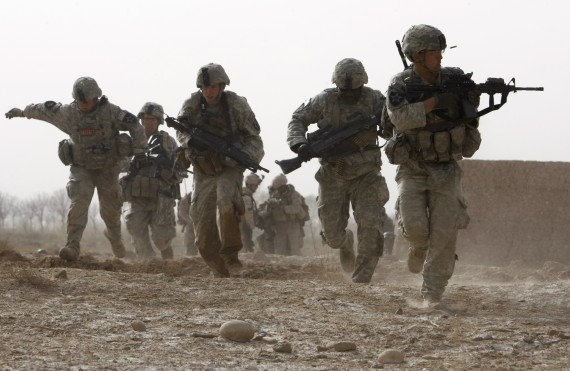

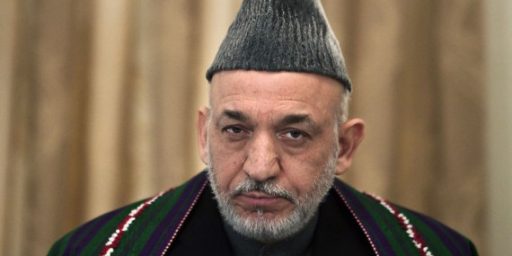
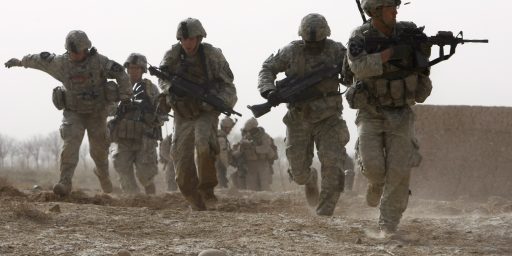

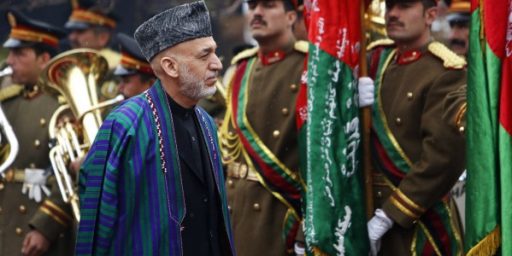
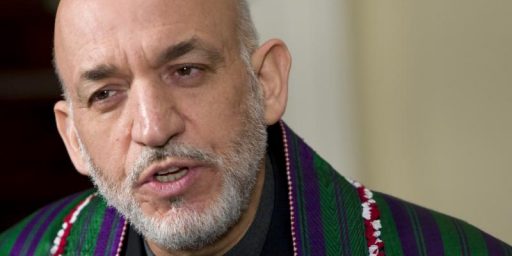
One of those rare occasions when we agree Doug.
I fully expect the GOP House to pass an appropriations bill without the funds for a draw down of US troops there.
“We can’t have had these brave Soldiers and Marines die for nothing.” Louie Gohmert will say.
“…although both of the major candidates to replace him have said that they would sign the agreement with the United States. ”
Well, now that Obama has publicly committed to a course forward without having an actual agreement under his belt there may have to be one or two more concessions to the new Afghan President. Nothing too serious, just a little more fun and profit.
America has been through this all before when we tried to “Vietnamese” the war in Vietnam and the government in South Vietnam lasted about two years against a better organized enemy. Expect the Taliban and al Qaeda or newer upstart Islamist extremists to redouble efforts against any weak government, army and police force without American support.
Foreign and military policy cannot be based on appealing to popular sentiments at home, but needs to be based on more consistent standards of protecting the national interests of the United States. I’m very doubtful the government, military and police in Afghanistan are really advanced enough to withstand protracted insurgent problems with Islamist extremists intent of restoring an Islamist extremist government to power without real support from the U.S. military.
Not good enough. The entire war was a mistake and we should have left ages ago.
If Barak Obama wants to stay in Afghanistan, let him pay for an army and move to Afghanistan
so he can learn what war is really like since it’s obvious he is clueless.
President Obama stated something that every American needs to listen to today. He simply stated that it is dangerous for America to let the world community know that America is less likely to use military force to defend it’s interests, but it’s want America wants at this point. – This is important because America wants to avoid smaller police actions in troublespots now. many more Americans may die in future terrorism or wars. – In terms of American lives, this isn’t good economics. – Lose some American lives in police actions now, save large numbers of American lives later or else save some American lives now avoiding police actions, and spend many more lives in terrorism or wars later. – Foreign policy needs public input, not public control. Foreign policy by public opinion isn’t good policy.
So far his success rate is 0. We are still wasting lives and treasure in at least 2 pointless wars. Perhaps if he was more aware of the REAL cost of war he might have a better grasp of what this country has lost in every military action since Viet Nam and would understand why Americans are justifiably angry about Afghanistan and Iraq-two worthless countries that we should have stayed away from. For him to insist on wasting more lives and money is outrageous and foolhardy, particularly since he is risking nothing himself.
@Robin Cohen: Whatever possessed Obama to start those wars?
You’re kidding, right? The idiot Bush started them for his own twisted reasons.
Obama SHOULD get us out BUT we are still in BOTH Iraq and Afghanistan and it looks like we will be in both place to some degree forever. Total waste of lives and money.